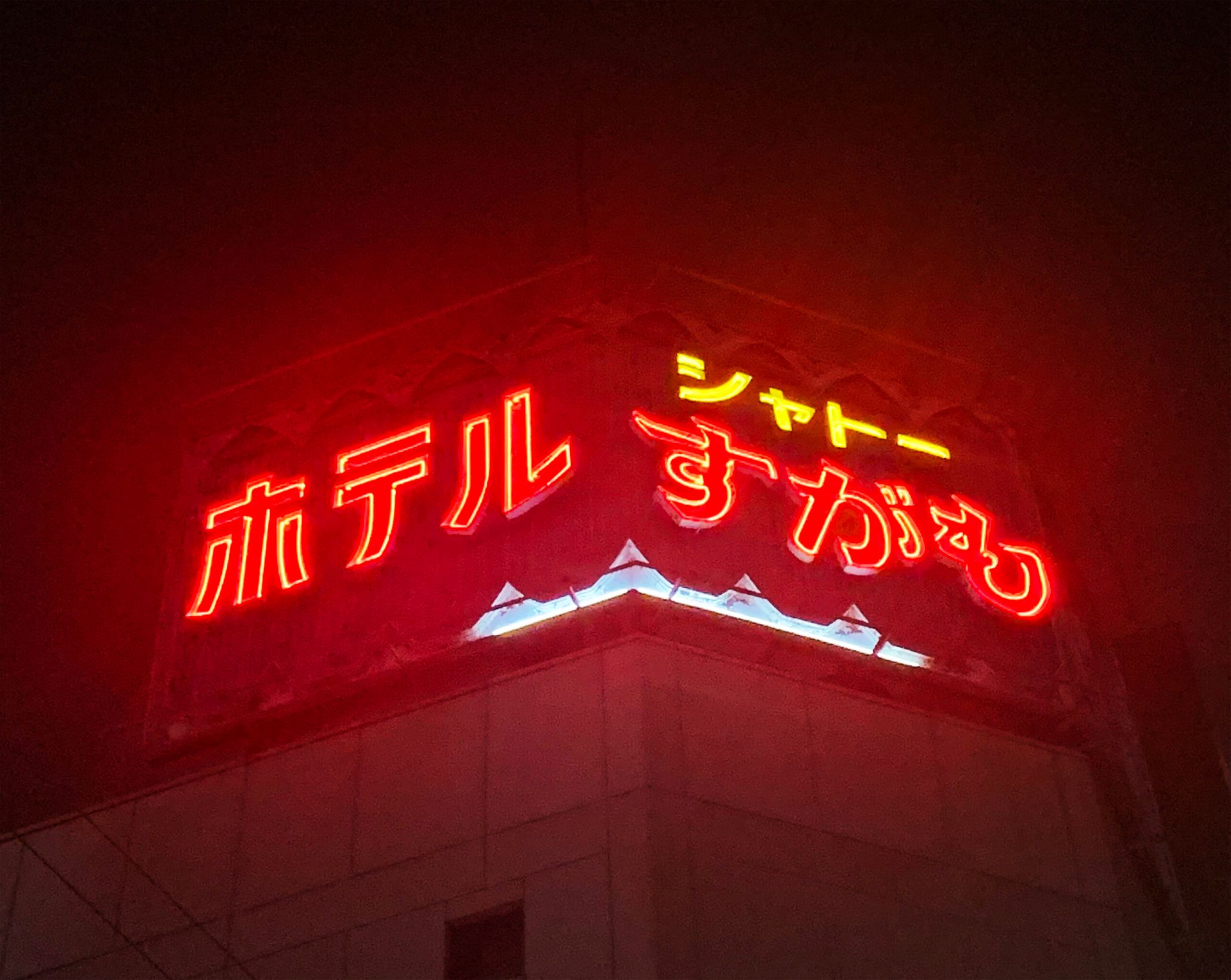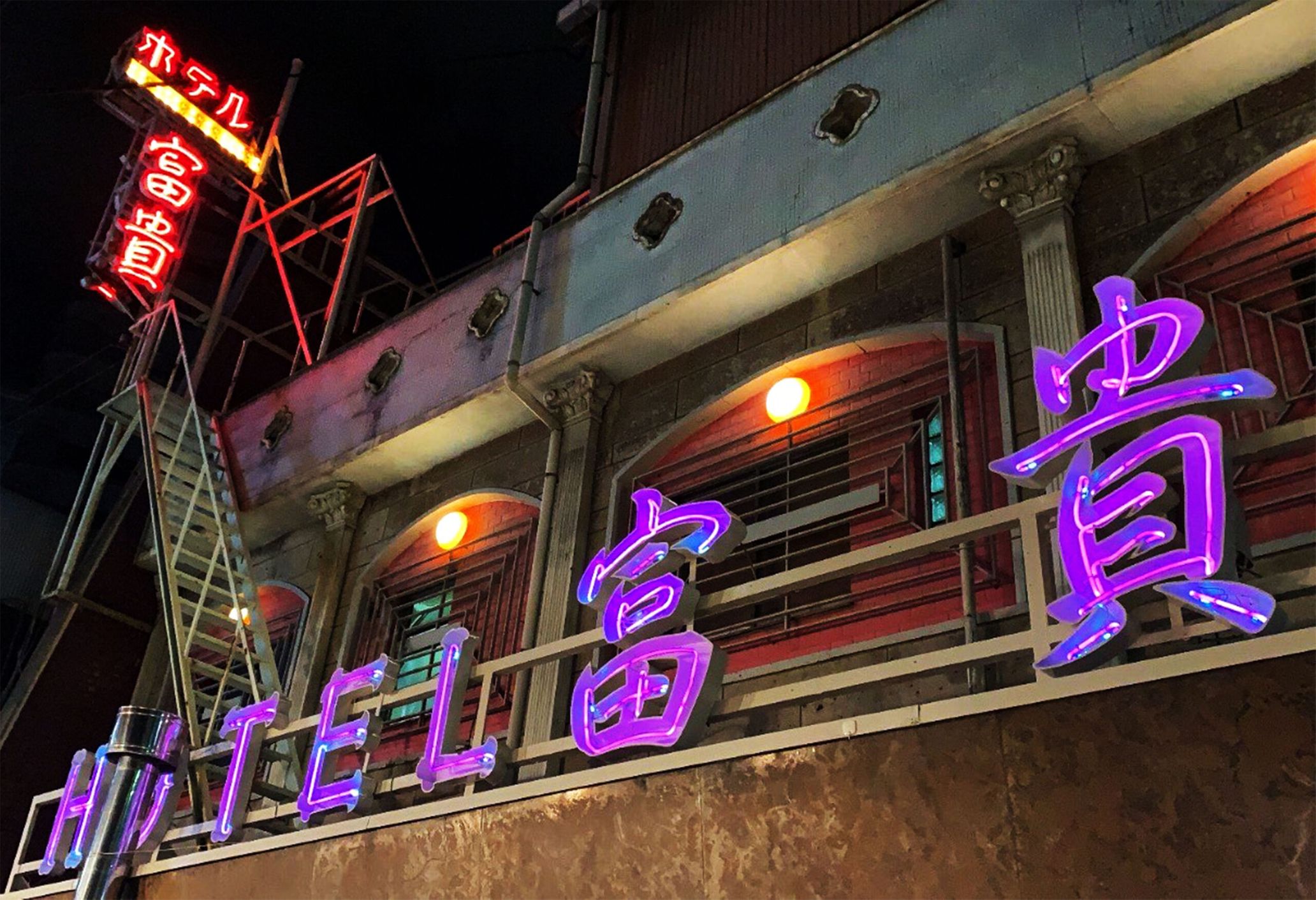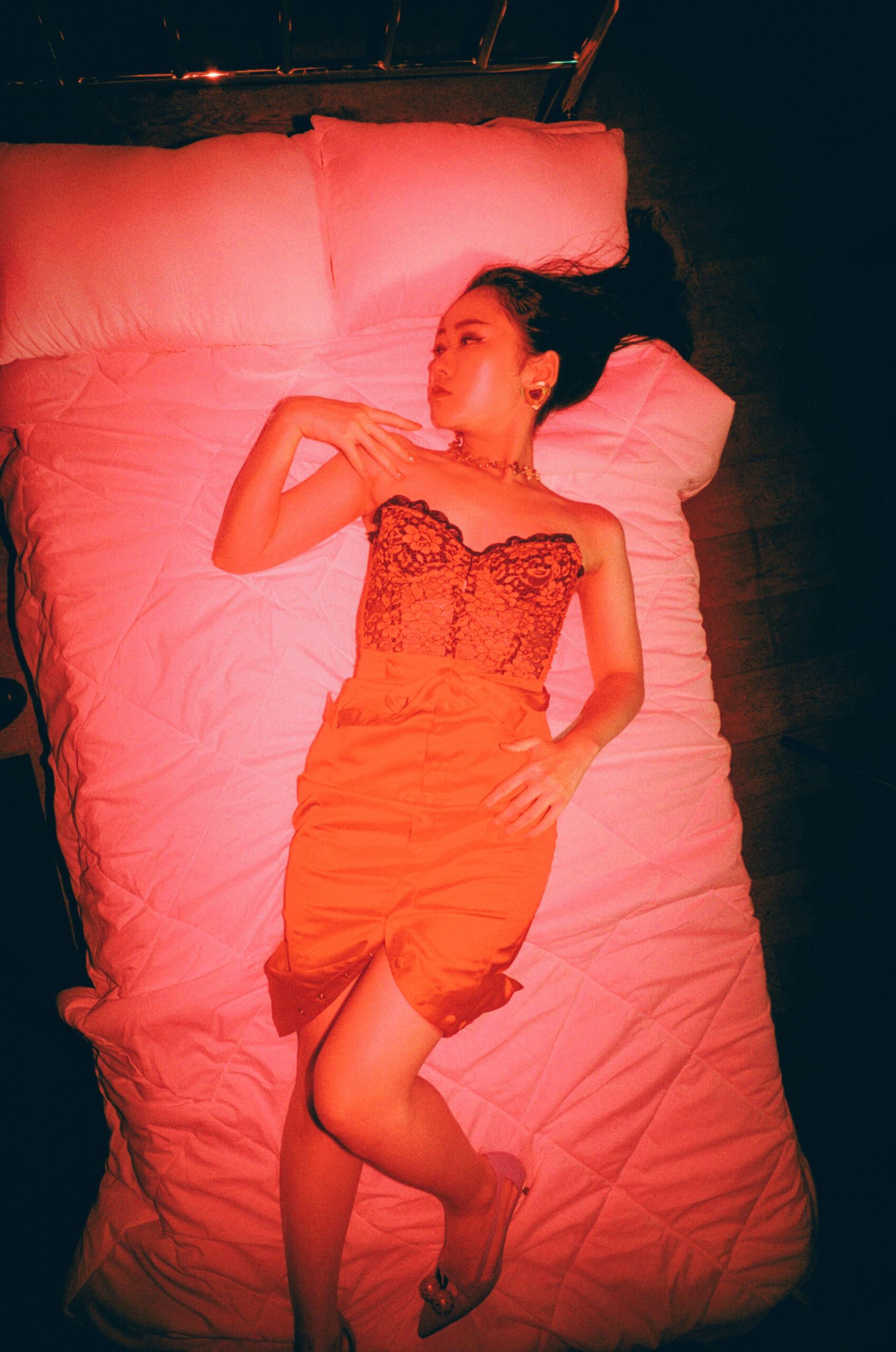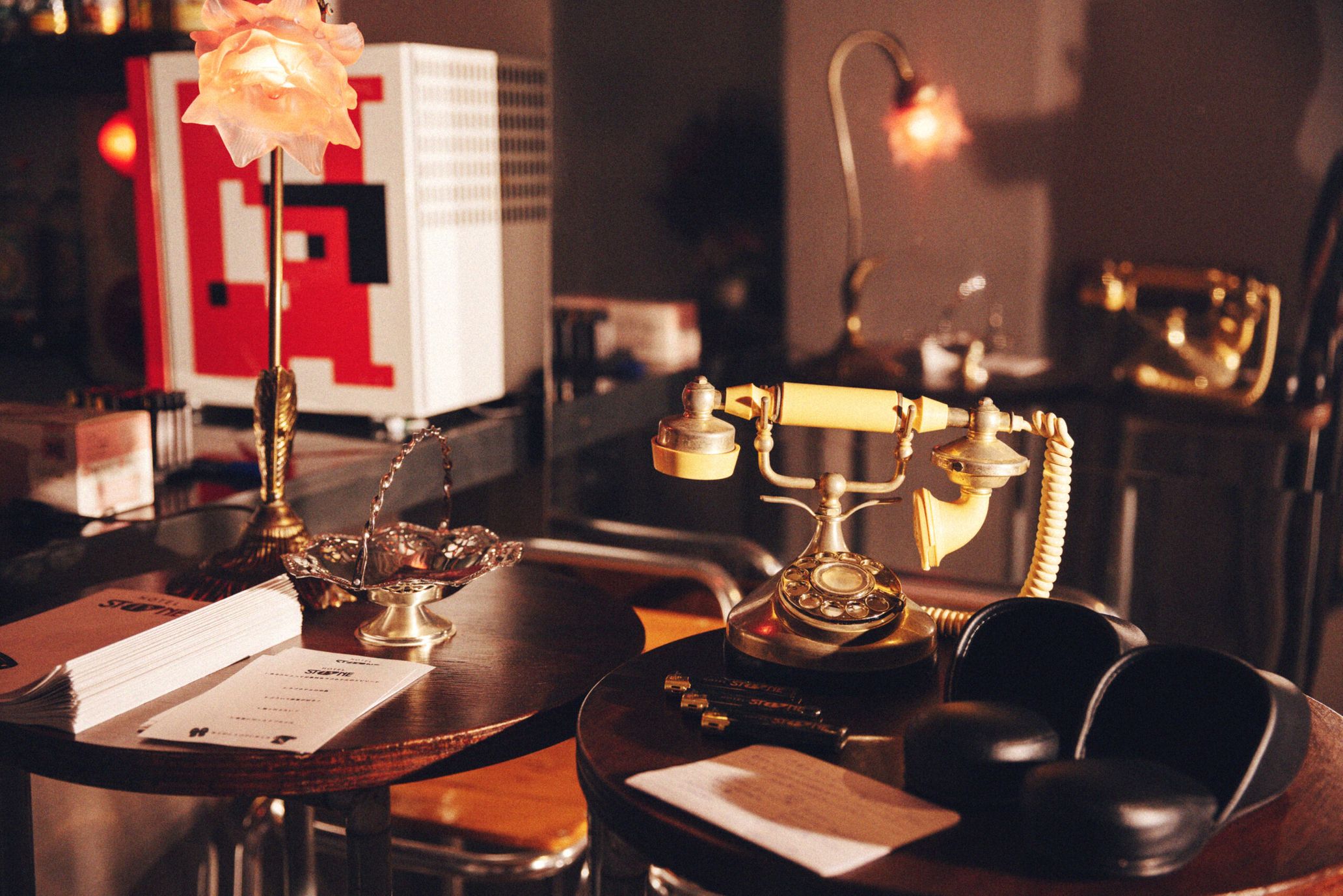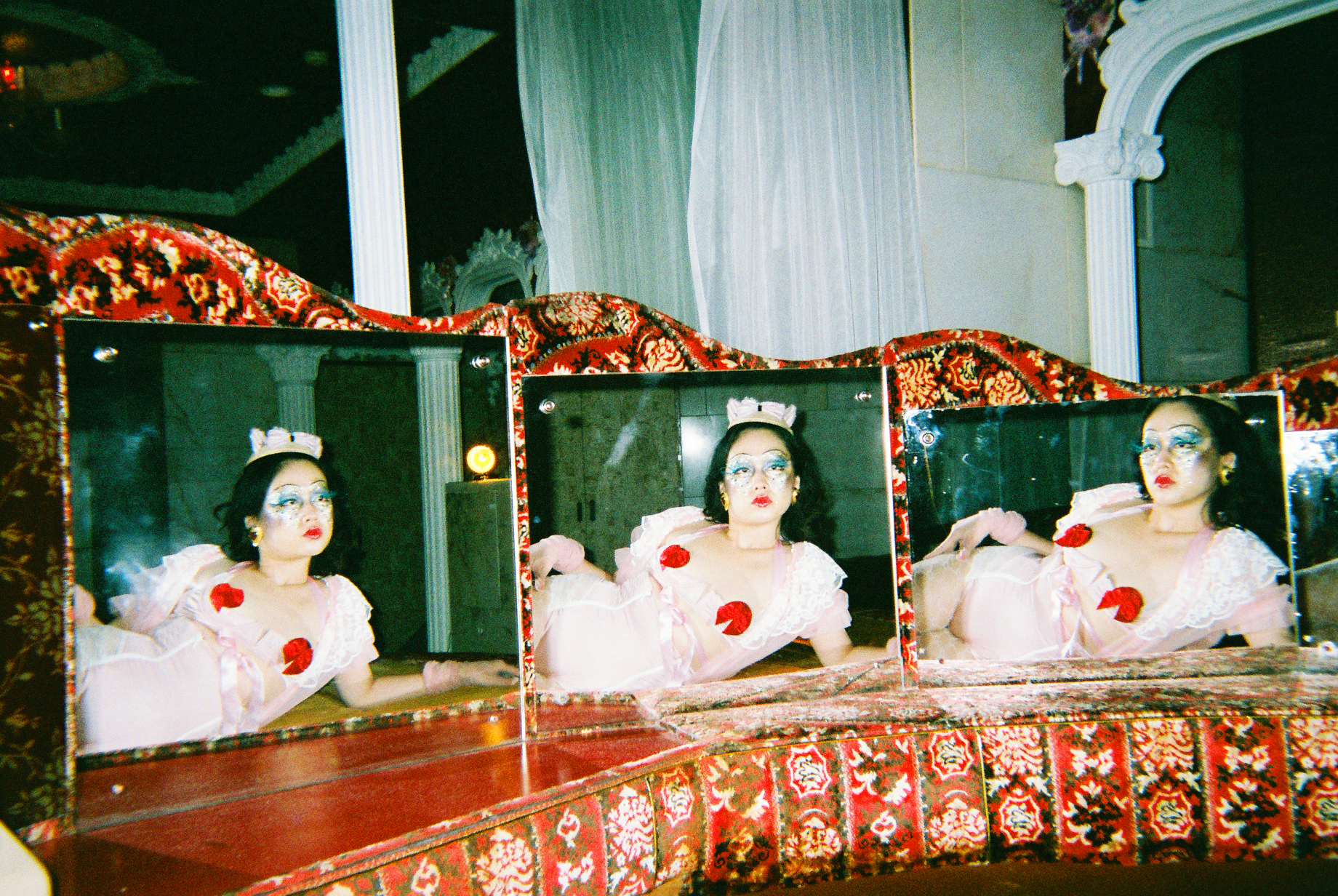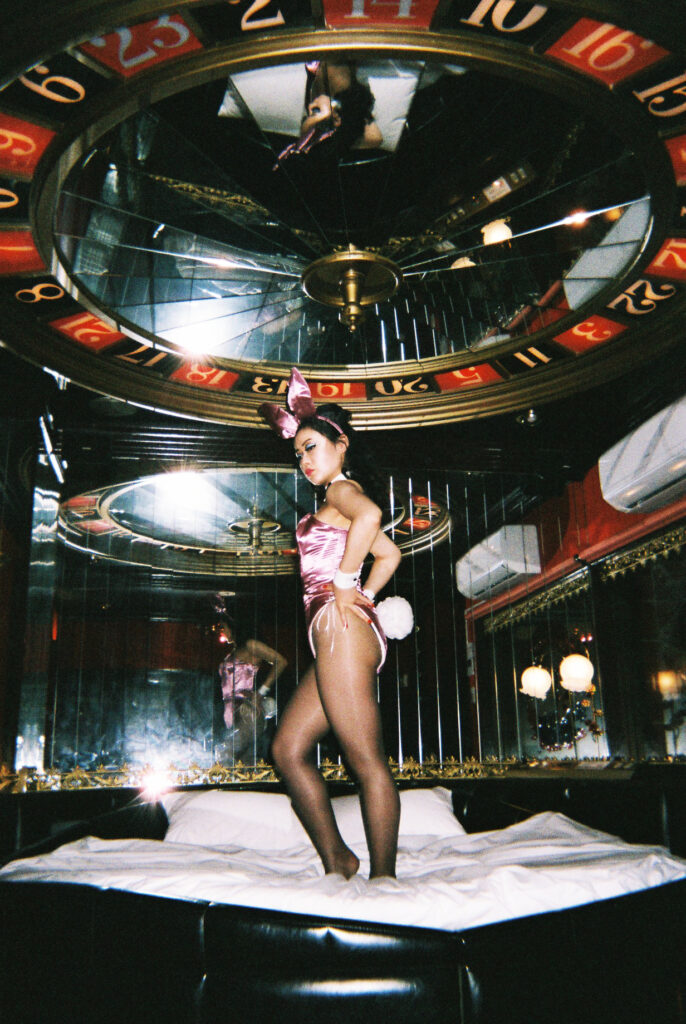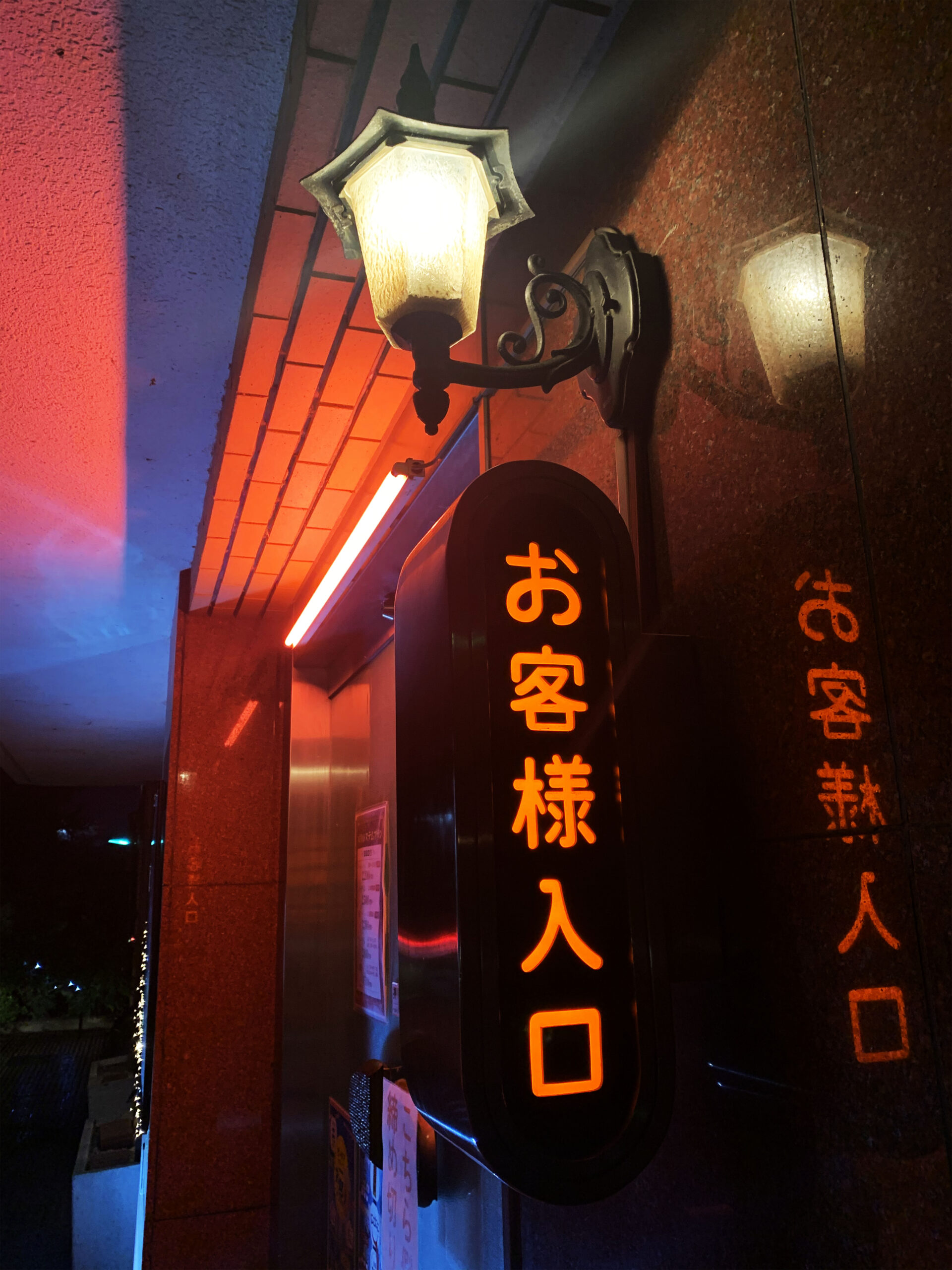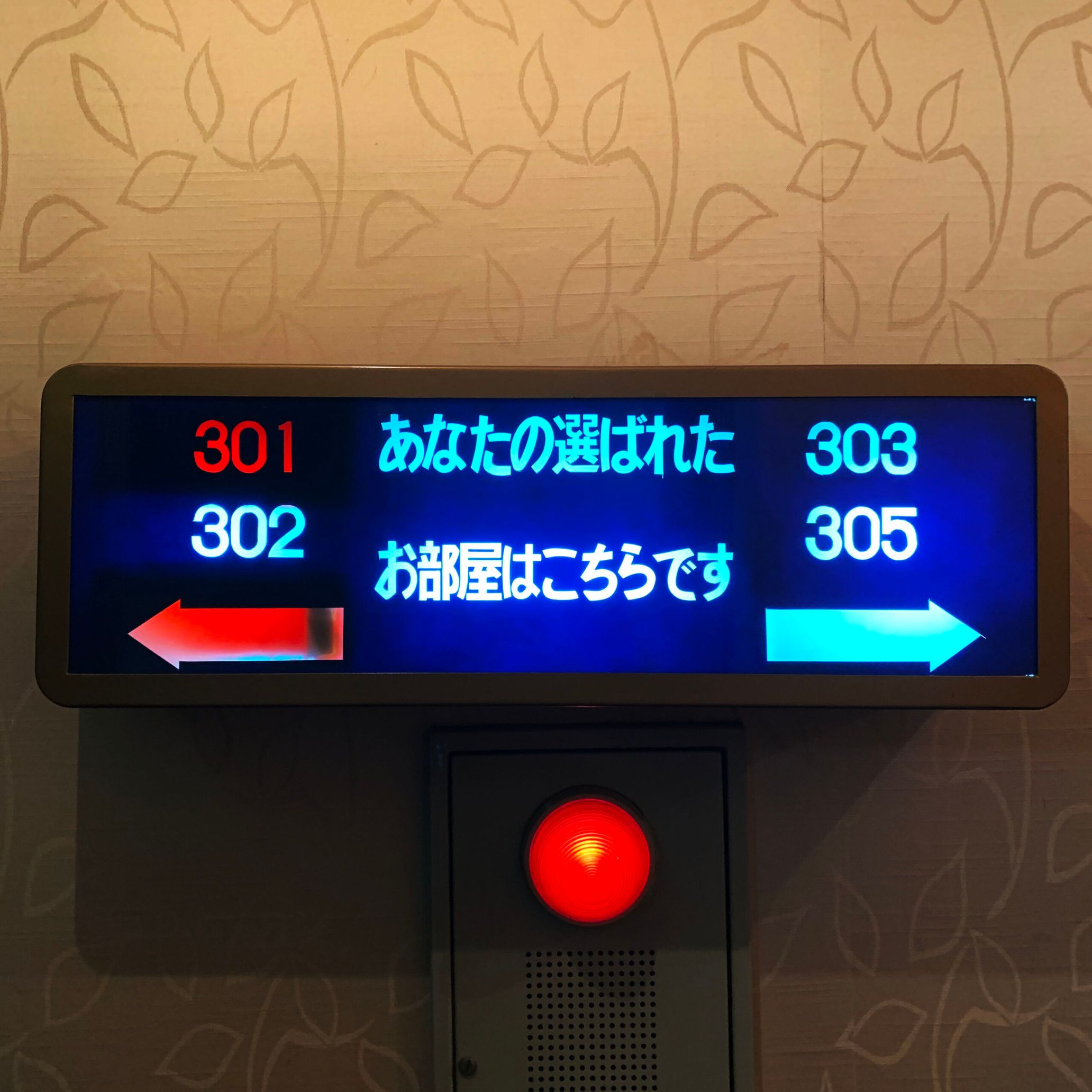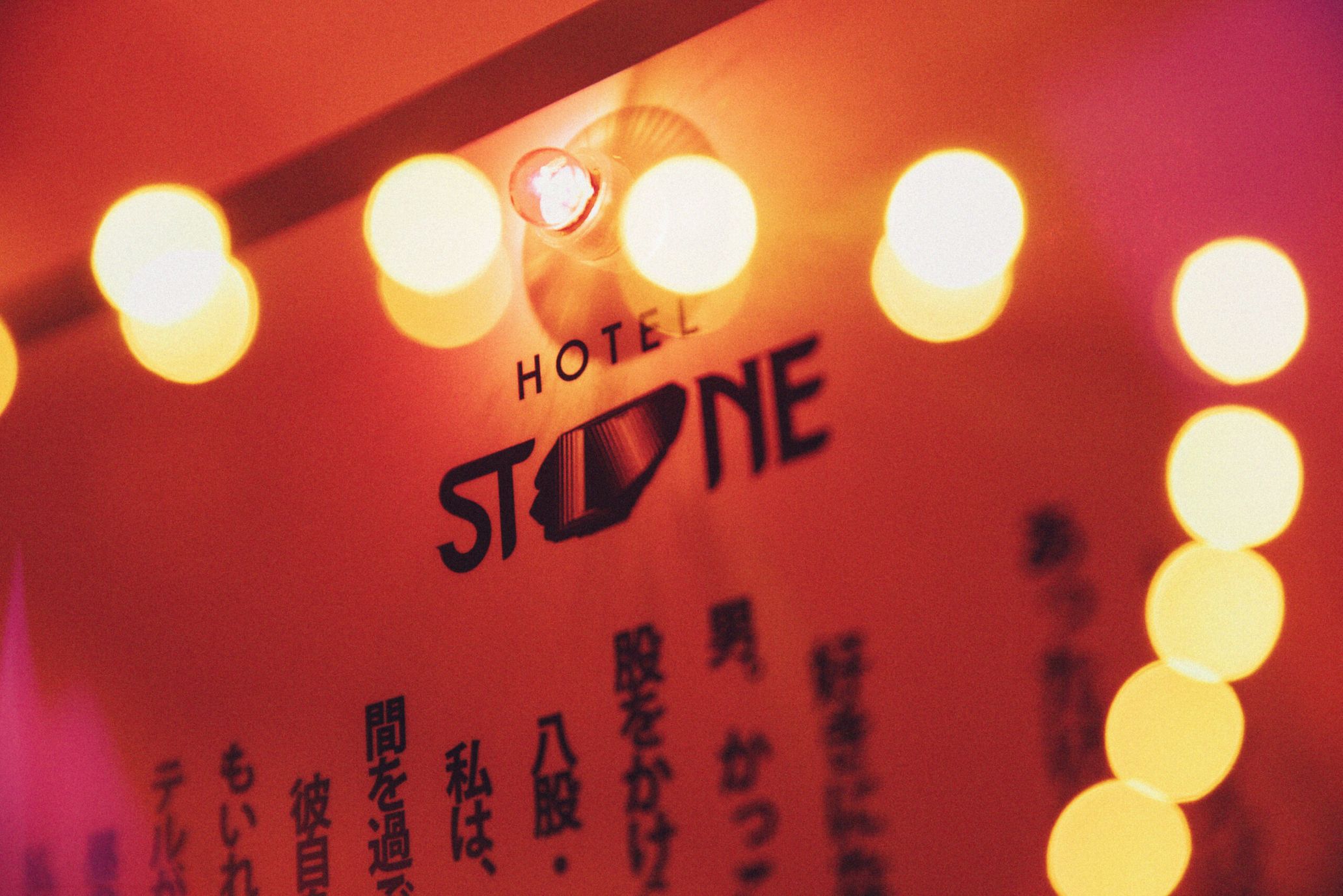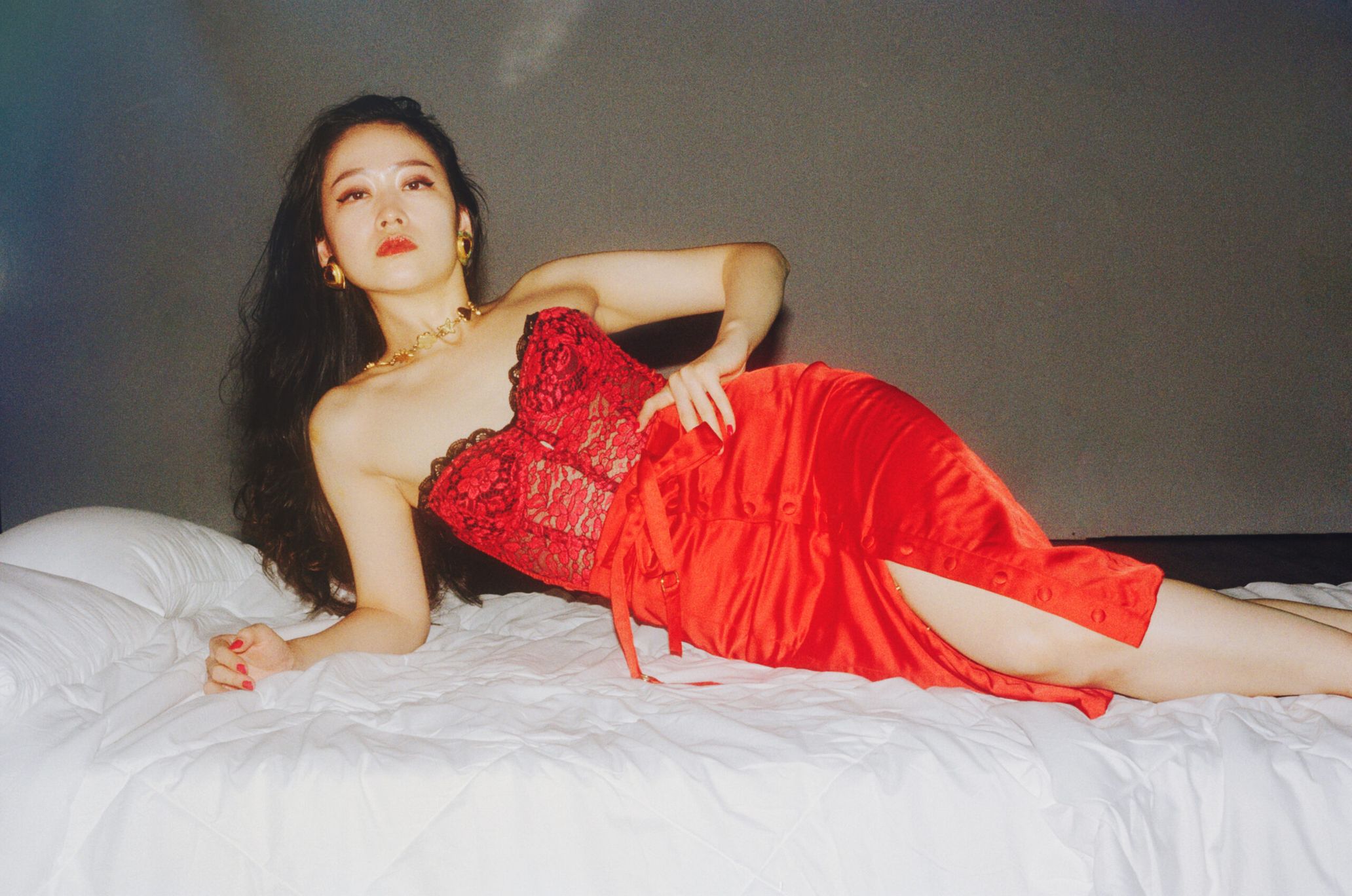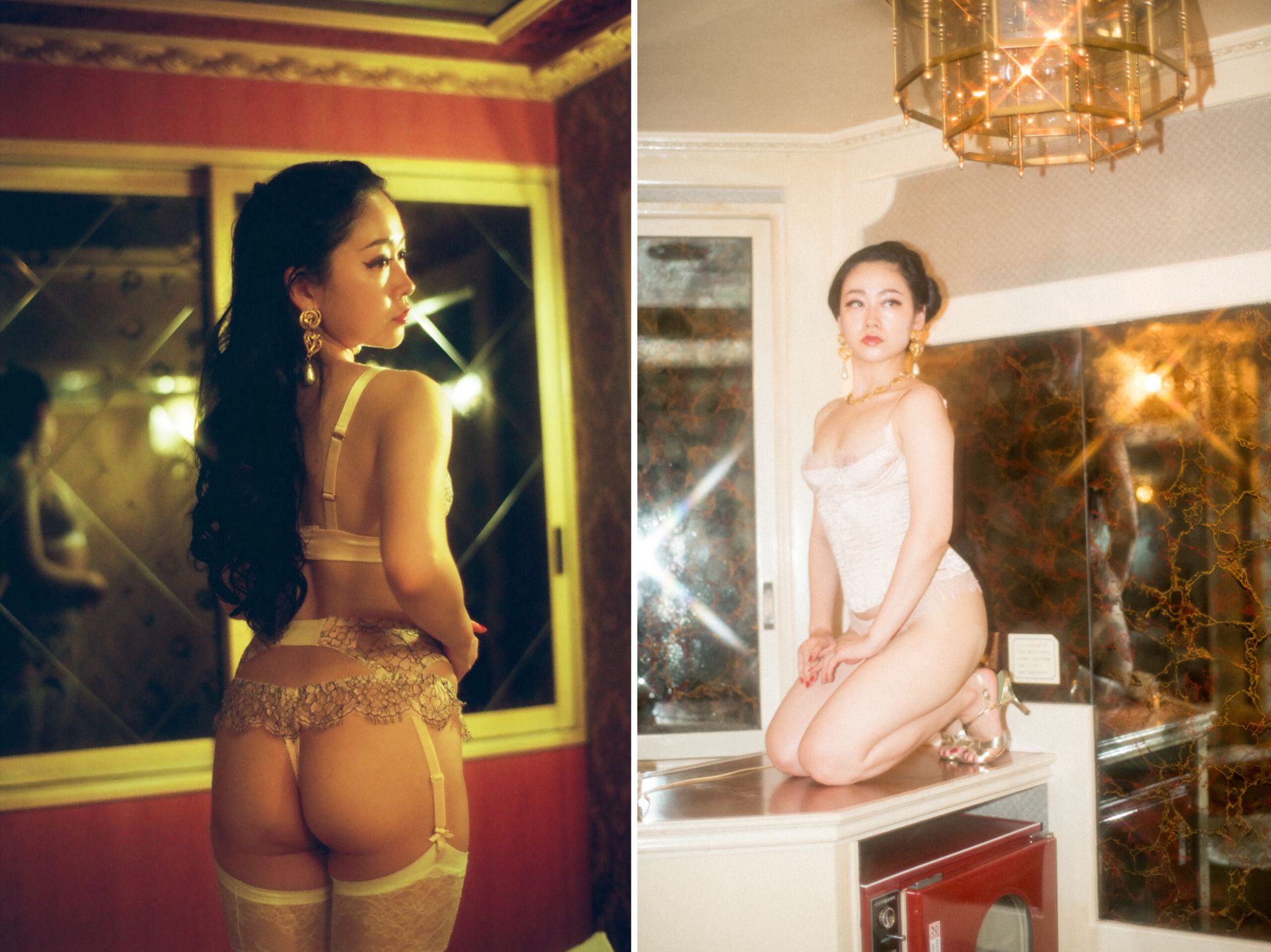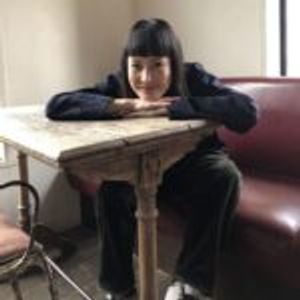Bewitched by the allures of the night, Momoko Ishihara is an artist who works in nightlife. She dreams of building a lively scene. Since her teen years, she’s been intrigued by love hotels*, especially those from the Showa era. As a “lingerie performer,” she throws herself in love hotels in different areas and takes highly artistic self-portraits. Ishihara channeled her curiosity and passion towards love hotels in her solo exhibition, Hotel Stone Room No. 507; Fragments of a Memory at Galaxy Gingakei in Harajuku, in July.
Why is she so attracted to love hotels? We get down to the magic of love hotels from the Showa era through interviewing her.
*A love hotel is a short-stay hotel for guests to engage in sexual activities.
Being attracted to shimmering neon lights as a little girl
——When did you become interested in love hotels?
Momoko Ishihara (from hereunder, Momoko): This is probably a memory I had when I was roughly three years old. Whenever I traveled with my mother, it was always by car, and she would strap me into a baby car seat. I remember how I loved looking at the view from inside and would chase the glittery lights of the night with my eyes. The neon signs were especially memorable. Eventually, I began thinking, “Those neon lights aren’t solely cute.”
——How did you become immersed in love hotels after that?
Momoko: When I was in high school, Village Vanguard still had an adult section, and that’s where I discovered Kyoichi Tsuzuki-san’s Love Hotel—Satellite of LOVE. When I saw that book, it became clear that the scenery I saw from the car was love hotels. Every time I flipped a page, the interior was so striking; it surprised me like, “I didn’t know love hotels were this adventurous.” I felt invigorated. From there, I wondered, “Why do people have sex there?” I wanted to visit one, but I didn’t have a partner then. I was like, “I need to find a partner asap!” (laughs).
——I heard the first love hotel you went to in high school was in Shinjuku. What sort of conversations about love hotels did you have with your classmates in middle and high school?
Momoko: Love hotels were a pretty mature topic. A friend that first stepped foot in one told me she knew of a good hotel—a cheap one in Shinjuku. The benchmark for “good” was only regarding how cheap it was, but I believed her and went there. When I finally went inside, I felt like an adult. I went to an all-girls school, so not a lot of girls had partners. I exchanged valuable information with a few friends.
Being influenced by late-night TV and discovering the adult world
——As someone born during the Heisei era, what made you immersed in Showa-era culture?
Momoko: Late-night shows. My parents never told me to go to bed as a child, so I watched TV at midnight, as well. I saw erotic scenes, and I also saw these women shake their butts for the opening sequence of Tamori Club and thought, “This is what it must mean to become a lady.” According to my mother, I would imitate them by shaking my butt and dancing in my diaper (laughs). I thought it was an interesting dance move. The late 90s were during the Heisei era, but perhaps there were subtle remnants of Showa left. I vividly remember how women would show skin. I also remember how I would watch bedroom scenes and be like, “That’s what it’s like?” The world of TV influenced me, and I was deep in my imaginary world.
——What are the criteria when you visit love hotels?
Momoko: Sometimes, I visit one after hearing someone talk about it. Other times, when a sign interests me while I’m driving, I take notes to look it up later. Also, I visit love hotel districts, and if the entrance or panel of rooms makes me feel like they might have a nice room, I go inside.
——When did you start photography?
Momoko: In 2016, I did a casual shoot on my iPhone. I went to a love hotel by myself for the first time to see what the interior was like. The first one I went by myself was ALAND in Shibuya. I went there once before, and I thought it was nice because they had a rotating bed. I pressed the button, got on the bed, and took pictures while I was rotating. Then, I realized, “I can take cool photos like this.” I had never gone to a love hotel with that perspective, so I figured I might be able to take something interesting if I could have the right lingerie and idea. That inspired me to start shooting.
——You spoke about this during your conversation with Kyoichi Tsuzuki-san at your exhibition, but you could consider rotating beds as the symbol of the economic bubble era. It’s the apex of when there was an entertainment value to love hotels.
Momoko: I was drawn to that entertainment element and became even more interested in love hotels from the Showa era. These things differ slightly depending on the times, but every corner of the room’s interior is elaborate. During the late 70s, love hotels had commercials. A lot of rural areas played them. I heard about that from someone who knows about that time, looked it up on YouTube, and found so many love hotel commercials from all over the country. The catchphrases had a happy vibe like, “Newlyweds, please visit us!” and “Have fun at paradise.” The Japanese family structure at the time has to do with this. Many households housed three generations, meaning the only space newlyweds could be alone was in love hotels.
Then, the bubble economy started, and once people began to have disposable income, they started acknowledging love hotels as places where you can “buy time to meet someone” and hide from society. People wanted to escape that reality and shared the desire to enjoy love hotels as entertainment. I try to go to places where I could sense the backdrop of its time, but half of the love hotels in Tsuzuki-san’s book are gone, so I had to hurry.
——What’s the difference between love hotels today and the ones from the Showa era?
Momoko: Recently renovated love hotels are like regular hotels in the city. It’s comfortable to use. You know how the previous generation thought some things were wrong?
Love hotels from the Showa era used to have a bad reputation, so now, they have no erotic qualities whatsoever. The food’s great and they have various accommodation plans; it’s as if the services belong to a regular hotel. I understand that it’s trendy now, and I think it’s comfortable when I go to one. But then it’s like, “What even is a love hotel?” The sex part went away somewhere.
——You start to feel: “I can just go to any hotel, not a love hotel!”
Momoko: Yes. That’s why values towards sexuality are shifting, too. If nothing’s allowed, then we can’t distinguish the good from the bad. We get an abundance of the same, homogenized things.
Memorable love hotel stories from everywhere
——At your show, you displayed anecdotes related to love hotels, and it resonated with me.
Momoko: I asked people from different generations about love hotels for this exhibition. Everyone had a spot that gave them cherished memories. A plethora of stories was being born.
Whenever I shoot at a love hotel, I sometimes see fingerprints on mirrors and tear off the bed’s mattress. I would find a used condom bag. I slowly developed an interest in these scattered traces. It makes me think, “So, this is where people had sex.” It’s raw and feels alive. Those discoveries made me want to ask people about their love hotel anecdotes. In 2013, when I was 20, I experienced something sad at a love hotel for the first time. Because of that, I created an installation called Love Hotel and asked women my age about their sad experiences, too. But this time, instead of limiting myself to sadness, I brushed it up by listening to stories from a wide range of men and women.
——What was it like listening to their stories? Was there a particularly impactful story?
Momoko: One of the seven anecdotes was told to me by a man in his 60s, and he’s knowledgeable about Showa culture. He used to go to love hotels a lot back in the day. At first, love hotels catered to lovers, then the systems and interior changed according to the era when he was in his 20s and 30s. He talked about roughly 50 years of experience, and it was refreshing to hear about love hotels from a man’s perspective.
Because I haven’t experienced Showa, a part of me glorifies it. He said, “Everyone had money then. We didn’t notice we were in an economic bubble. We just had so much fun. Of course, we lost a lot of money too.” He told me these things with no filter. It made me think it wasn’t out of the ordinary for people to go to eccentric and gaudy love hotels.
——Did you ask young people about their experiences?
Momoko: Yes. I wanted to ask people that are younger than me about their thoughts on love hotels. This woman told me that she would occasionally go to love hotels with her boyfriend at the time, but they never spoke about what transpired there. She regrets how they broke up without talking about it. Talking about love hotels and sex with her friends was taboo. I realized through listening to people’s stories that everyone avoids talking about sex, regardless of age.
——It sounds like she went to love hotels but couldn’t confirm what each party thought about the act itself.
Momoko: We don’t tread on the subject of sex. It would be better if we could talk about that more casually. It was a personal act to ask people about their memorable anecdotes at love hotels. But I’m glad I found out about how they felt and what their thoughts were about every single act, in detail. Love hotels aren’t places you go just to have sex. This research taught me a lot.
Venturing out in pursuit of the answer to the question, “What makes a love hotel?”
——What was the biggest takeaway you had amid chasing after love hotels?
Momoko: I had always wondered, “What is a love hotel?” Why was I so drawn to love hotels from the Showa era? I would always go to one alone out of curiosity and react whenever I spotted a sign. The many pretty rooms I’ve seen are impressive, but when I think about it rationally, it’s such a mystery why there are so many places for people to have sex all over Japan.
——You take very artistic photos of yourself in lingerie at Showa-era love hotels. How particular are you when it comes to that?
Momoko: A lot of the love hotel rooms I love have a name and concept. I’m moved by how the details of a room’s interior are so cool. I want to take photos without destroying the quality of the room. I see the room as the stage, and I adapt myself to it. More than standing onstage, I want to continue taking photos by blending into the room. Showa love hotels have richly colored visuals—even if you dim the lights, the colors in the room jump out at you. Whenever I finish shooting and leave the room, I notice how brilliant the colors are inside. People who made love hotels back then were creating a different universe.
——Love hotel is a Japanese word, yes?
Momoko: Yes. It’s a beautiful word. I believe love hotels are for lovers because it’s called a “love” hotel. We should all enjoy it more in a fun way.
——Is there anything love hotel-related that you want to do?
Momoko: Love hotels from the Showa era will be renovated in the future, and over the past few years, many have closed their doors. Recently, a love hotel I loved in Sugamo, Chateau Sugamo, shut down after being open for 42 years. I had a shoot there for the last time, and every room I saw and shot was so cool. It moved me. This type of love hotel won’t be built now, so I want to continue taking photos of love hotels and document how I feel. I want to consider the era of such places and how places—where people love one another—will change in the future.
Momoko Ishihara
Born in 1992 in Tokyo. With the question, “Why was I born as a woman?” Momoko Ishihara creates various works about herself and others, her experiences, and what she strongly feels. She hosts parties and studies and observes people’s tendencies. She started her love hotel project, Hotel Stone, in 2019 and makes different iterations such as self-portraits, installations, videos, and so forth.
Instagram: @pp_momoko
Photography Takaki Iwata
Transration Lena-Grace Suda


